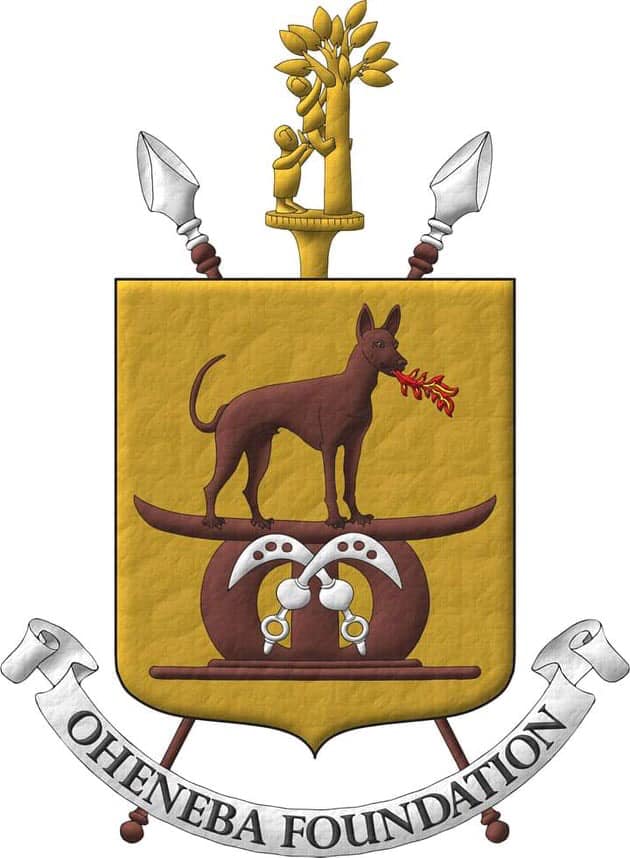
Oheneba Foundation
DOWNLOAD THE JOINT 2023 OHENEBA FOUNDATIONS REPORT AND 2024 PROSPECTUS
On the anniversary of his enstoolment in 2019, H.R.H. Oheneba Nana Kwame Obeng II stated,
I am Tufohene (Warlord). We fought wars for territorial expansion to gain more land and resources for use by the people. Sometimes we waged wars to control trade routes and gain access to important markets, while other wars were to secure the boundaries of the state. Today, there are no more wars. I, therefore, declared war on illiteracy, poverty, disease, and unemployment to promote development in my Kingdom and beyond, calling for the needed support in this regard. I am committed to fighting a different type of war in the 21st century, a war in the form of development.
Under the Republic of Ghana law, The Companies Act, 1963, Act 179, H.R.H. Oheneba Nana Kwame Obeng II, Chief of Sefwi Obeng-Mim, created and registered with the Republic the Oheneba Foundation as a Community Development Fund to help finance development initiatives, projects, and programs in the stool lands under his care.
The Foundation focuses on five key areas: Education, Health, Water and Sanitation, Agriculture, and Infrastructure.
Governance
The Oheneba Foundation (Ghana) was registered in Accra on 21st February 2020, registration number CG012342020, and tax ID number C0035079169. The Oheneba Foundation was certified by the Department of Social Welfare as a Non-Government Organization (NGO) operating in the Suaman District Assembly (Dadieso) on 20 October 2020, registration numbers DSW/SDA/NGO/02, R.G.D./CG012342020.
The Foundation has a formalized governance structure and funding mechanism. The Foundation has a 7-member Board of Trustees. Board members are appointed by Oheneba Nana Kwame Obeng II. The Board Officers are H.R.H. Oheneba Nana Kwame Obeng II (Dacosta Ofosuhene), Chairman; Patricia Ataah Kwarteng, Director; Agyiri Clearance, Secretary; Eddie Nikol, Auditor; Asante Stella, member-at-large.
Honorary members of the Board are Obahemaa (Queen Mother of Development) Nana Akua Kra II (a.k.a. Tee Gambles-Francis) of the U.S. State of Hawaii, and the Rev’d Dr. Christian D. Boyd of the U.S. State of Wisconsin as the Royal House Project Coordinator, Fundraising Officer, and Grand Chancellor of the Royal House’s international Asafo association.
Patricia Ataah Kwarteng serves as the Director of the Foundation and oversees the in-country day-to-day operations.
The Board meets once a year to review projects and programs, as well as approve the Foundation’s budget and expenditure. The accounts of the Foundation are audited annually by an independent financial auditor.
In 2022 the Oheneba Foundation (USA), Inc. was formed as an independent corporation in the State of Wisconsin as a Non-Stock, Not for Profit Corporation under Sec. 181.0202 of the Wisconsin Statutes and designation as able to receive tax-deductible donations under the Internal Revenue Code 26 U.S.C. §501 (c)(3) of the United States of America. The Oheneba Foundation (USA), Inc. State of Wisconsin Entity ID is o040065, and Federal EIN 87-3943248. The Oheneba Foundation (USA) operates in the U.S.A. as a nonprofit corporation, National Taxonomy of Exempt Entities (NTEE) classification code Q30: International Development. It corresponds and makes grants to the aforementioned Oheneba Foundation in Ghana.
The registered members of the Board of Directors are the Hon. Asafohene Panyin Rev. Kenneth W. Parris as President, the Hon. Nkyidomhene Katakyie Robert Kakalia as Vice President, the Hon. Adontehene Rev’d Dr. Christian D. Boyd as Treasurer and Managing Director, as well as Registered Agent, and H.E. Turner Walker, KGOG as Secretary. H.R.H. Oheneba Nana Kwame Obeng II serves as an honorary member of the Board.
The Development Area
Sefwi Obeng-Mim is composed of numerous farming communities in the Juabeso District in the Western Region of the Republic of Ghana. The Obeng-Mim Stool lands have about 1,500 people, many of whom are subsistent cocoa farmers. The primary development area is located in the middle of the Krokosue Forest Reserve under the Sefwi Wiawso Traditional Area, one of the largest forest reserves in Ghana. Due to the location of the community, it is difficult to access the most basic developmental project by the central government and government funding. Providing safe and clean potable water, as well as medical and educational development, as well as other human services, is left to the traditional chieftaincy institution. The Foundations in USA and Ghana also work in partnership with the Wiawso Traditional Council as all development is interdependent.
Development Goals
Education
Securing bright futures for young people in our communities is crucial. That is why the Foundation invests in scholarships, classroom blocks, libraries, and ICT centers, early childhood development centers, teaching and learning materials, as well as accommodation for teachers and the education directorate.
Health
Enhancing quality of life, preserving human dignity, and adding value to life have become possible through increased access to quality health and maternal care in our communities.
Agriculture
Significant investment in agriculture continues to improve the livelihood of members of our communities. Through the provision of inputs and extension services, farmers are producing more and contributing to the enhancement of Ghana’s food and nutritional security.
Infrastructure
The provision of infrastructure, including community centers and good roads, has eased transportation and improved the quality of life of members of our host communities.
Water and Sanitation
In collaboration with government agencies, NGOs, and other key stakeholders, we are addressing issues regarding access to potable water and sanitation in our communities. Through the provision of small-town water supply systems, mechanized boreholes, and hand-dug wells, our communities have unfettered access to potable water.

